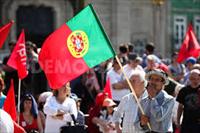 Research Interests
Research Interests
My research interests include comparative democratization, religion and politics, and comparative public policy.
My scholarship over the last twenty years has contributed to the literature on the various transformations brought about by democratization in the two Iberian nation-states. I have authored or co-authored seven books and numerous articles. One of my publications, “Religion and Politics in Iberia: Clericalism, Anti-Clericalism and Democratization in Portugal and Spain,” appeared in Religion and Politics in Comparative Perspective, edited by Clyde Wilcox and Ted Jelen, and was published by the Cambridge University Press.
Democratization and Civil Society in Portugal
 My particular area of expertise is on the transition period in Portugal as well as the role of religion in civil society during the process of democratic consolidation.
My particular area of expertise is on the transition period in Portugal as well as the role of religion in civil society during the process of democratic consolidation.
In Portuguese political history, civil society has
traditionally been a marginalized actor. During and immediately after the transition to democracy (1974-76), civil society was unable to develop strong organizations. Yet, while Portuguese civil society played a secondary role during the immediate transition period, voluntary associations and organizations formed and stabilized after 1976, once democratic institutions were established. 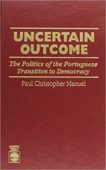 Portugal’s membership in the European Union helped deepen those new institutions.
Portugal’s membership in the European Union helped deepen those new institutions.
Thus, even though political institutions were not favorable for the development of a strong civil society for most of Portugal’s history, an organized civil society appears to be emerging under the new democratic regime (See South European Society and Politics Volume 4, 1, 1999 “Regime
Changes and Civil Society in Twentieth-Century Portugal” Kerstin Hamann & Paul Christopher Manuel, 71-96).
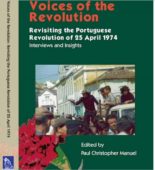 In 2020, I published Voices of the Revolution: Revisiting the Portuguese Revolut ion of 25 April 1974 — Interviews and Insights with the Portuguese Studies Review. After the revolution of 25 April 1974, the future of Portugal was in the hands of those military officers responsible for the overthrow of the previous regime. What would they do? A peaceful transition or a civil war? A capitalist or a communist system? Revenge against the old, or the establishment of a just, legal order? The revolutionary leaders spoke in terms of following a “3 Ds” political program of decolonization, democratization, and development, but there was no unifying conceptual vision of what those three Ds would exactly look like, or indeed any practical plan to achieve them.
In 2020, I published Voices of the Revolution: Revisiting the Portuguese Revolut ion of 25 April 1974 — Interviews and Insights with the Portuguese Studies Review. After the revolution of 25 April 1974, the future of Portugal was in the hands of those military officers responsible for the overthrow of the previous regime. What would they do? A peaceful transition or a civil war? A capitalist or a communist system? Revenge against the old, or the establishment of a just, legal order? The revolutionary leaders spoke in terms of following a “3 Ds” political program of decolonization, democratization, and development, but there was no unifying conceptual vision of what those three Ds would exactly look like, or indeed any practical plan to achieve them.
This volume revisits the events of April 25 with original interviews and new insights from a number of important scholars, including contributions by Nancy Bermeo, Maria Inácia Rezola, Stewart Lloyd-Jones, Luís Nuno Rodrigues, David Silva Ferreira, and Douglas Wheeler. The volume features interviews with 14 military leaders of the Portuguese Revolution conducted by me. These interviews took place in 1990 and 1991, some 15 years after the founding of the democratic regime in 1976, and just after the 1989 fall of the Berlin Wall. As such, these interviews bear close examination, as they provide perspectives not only on what happened in Portugal after April 25 but also offer an assessment of the role of Portugal in the third wave of global democratization.

On the left of this page is a photo of me with Otelo Saraiva de Carvalho, the chief strategist of the 1974 Portuguese Revolution in Lisbon.
Religion and Politics
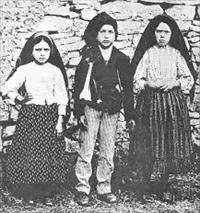
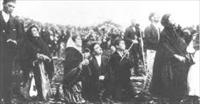
In the years since the 25 April 1974 revolution, Portuguese civil society has started to become more articulated, differentiated, secularized, and the role of the church in civil society has consequently diminished.T he numbers of new vocations for religious life is down, as are the overall numbers of self-identified Roman Catholics, and there are fewer who practice the faith. In addition, the Church has recently suffered a string of high-profile public-policy defeats, including the legalization of same-sex marriage and the decriminalization of abortion.
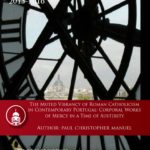
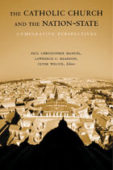 The Catholic Church is, of course, a very complex and complicated grouping of believers, but in the face of all these difficult challenges, many have come to wonder what hold the Church still retains on Portuguese associational life. My current research is on how faith-based organizations are contributing to the well-being of democratic life in Portugal.
The Catholic Church is, of course, a very complex and complicated grouping of believers, but in the face of all these difficult challenges, many have come to wonder what hold the Church still retains on Portuguese associational life. My current research is on how faith-based organizations are contributing to the well-being of democratic life in Portugal.
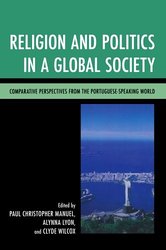
I have published an edited volume called Religion and Politics in a Global Society: Comparative Perspectives from the Portuguese-Speaking World with Lexington Books. The work adds new knowledge to the multidisciplinary global studies literature. It explores the legacy of the Portuguese colonial experience, with careful consideration of the lasting impression that this experience has had on the cultural, religious, and political dynamics in the former colonies. Applying the insights derived from three theoretical schools (religious society, political institutions, and cultural toolkit), this volume brings together scholars from a variety of disciplines, offering in-depth case studies on Angola, Brazil, East Timor, Goa, Mozambique, and Portugal-societies connected by a shared colonial past and common cultural and socio-linguistic characteristics. Each chapter examines questions on how faith and culture interrelate, and how the various national experiences might resonate with one another. This volume provides a deeper understanding of the Luso-phone global society, as well as the larger field of religion and politics.
Other recent works include an edited volume on Pope Francis as a global actor, with colleagues Alynna Lyon of the University of New Hampshire and Christine Gustafson of Saint Anselm College, and an edited volume examining the relationshiop between faith-based organizations and social welfare in Western Europe, with Miguel Glatzer of LaSalle University . Another piece, entitled “Religious Restriction in France,’ appeared in the Oxford Research Encyclopedia of Politics. (2019)
Comparative Public Policy
My 2014 work The Path of American Publi Policy: Comparative Perspectives, co-authored with Georgetown University professor Anne-Marie Cammisa, was recently “highly recommended by Choice maganize, the publishing unit of the Association of College and Research Libraries.
The book is designed for use in a variety of political science classes, including American politics, Comparative Politics and Comparative Public Policy. 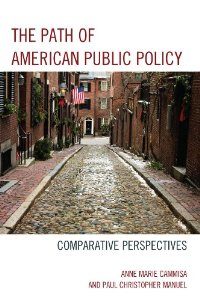
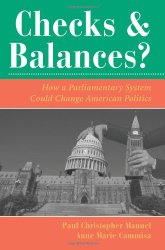 The book explains why American government is unique, how political decisions and historical factors lead one country to a different form of government from another, that democracy can exist in differing forms, and that the form of government a nation chooses impacts the policy outcomes within that nation. It is an update of our 1998 textbook called Checks and Balances: How a Parliamentary System Could Change American Politics.
The book explains why American government is unique, how political decisions and historical factors lead one country to a different form of government from another, that democracy can exist in differing forms, and that the form of government a nation chooses impacts the policy outcomes within that nation. It is an update of our 1998 textbook called Checks and Balances: How a Parliamentary System Could Change American Politics.
I have also published an edited volume with Suffolk University profesor Sebastian Royo examining the political, social and economic transformations in Spain and Portugal after they joined the European Union.
Star Trek and Politics
In all five of its televised series as well as its various movies, Star Trek story lines abound with the imp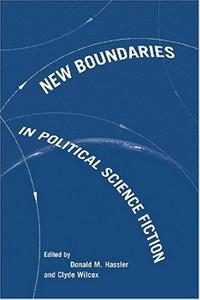 ortance of the individual. From Captain James T. Kirk observing that “in every revolution there’s one man with a vision” to Captain Jean-Luc Picard noting “if we’re going to be damned, let’s be damned for who we really are,” and Captain Katherine Janeway declaring “we will find a way out of here,” we can see that individuals-and especially leaders- matter in the Star Trek universe.
ortance of the individual. From Captain James T. Kirk observing that “in every revolution there’s one man with a vision” to Captain Jean-Luc Picard noting “if we’re going to be damned, let’s be damned for who we really are,” and Captain Katherine Janeway declaring “we will find a way out of here,” we can see that individuals-and especially leaders- matter in the Star Trek universe.
My two ch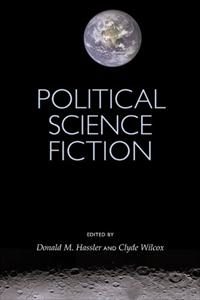 apters in the Political Science Fiction series examine the role of the individual in the Star Trek saga, with a focus on the original series which ran from 1966-1969.
apters in the Political Science Fiction series examine the role of the individual in the Star Trek saga, with a focus on the original series which ran from 1966-1969.
The chapters explore some theoretical issues, and then examine the various ways that the individual influenced events in the Star Trek universe. Throughout, they seek to illustrate how Star Trek takes individual actions seriously. That is, under what conditions might the personality of a particular leader actually direct the course of history?
